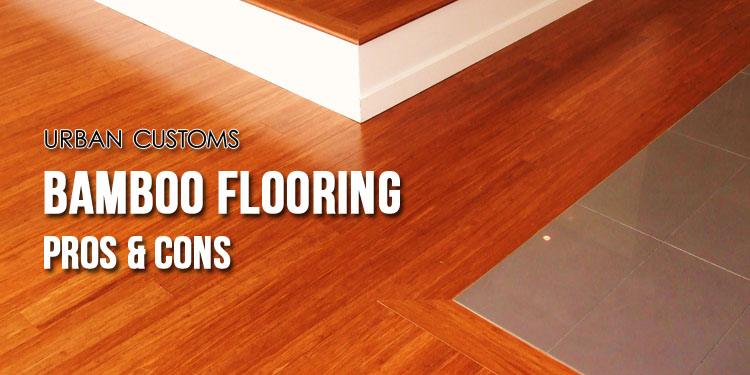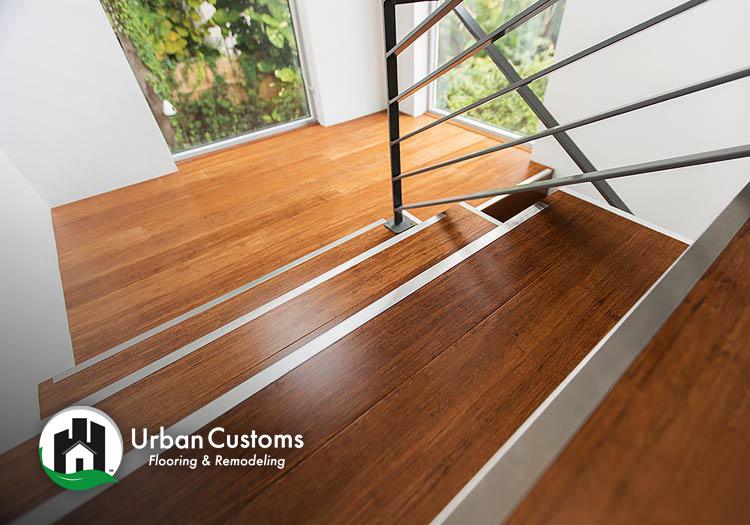Bamboo Flooring Pros & Cons
Bamboo Flooring PROS – Bamboo flooring is easy to maintain, ecologically friendly, natural, water-resistant, durable, and affordable. Bamboo flooring is also great for refinishing. Bamboo Flooring CONS – Even though it’s durable, it can still get scratched over time.
Bamboo is a natural flooring cover material that is similar to hardwood flooring, but it is actually made from a grass. It has plenty of positive benefits like hardwood floors, as well as vulnerabilities and drawbacks. The more that you understand about this material, the better informed you will be whenever you make maintenance or buying decisions.
Bamboo Flooring Pros & Advantage
The pros and advantages of bamboo flooring include:
Pro: Easy to Maintain
Bamboo is easy to care for. You just vacuum or sweep it regularly to remove debris. You can even clean it with a non-alkaline, non-wax bamboo or hardwood floor cleaner or just damp mop it.
Pro: Ecologically friendly
Bamboo wood is a form of vegetation. Bamboo is highly renewable that grows to maturity within 3-5 years. This is much quicker than hardwood trees which take 20+ years to mature.
Pro: Natural Material
Natural material usage is a big trend in construction right now. People are becoming more ecologically conscious and are wanting products that state this. They also want designs and materials that fit modern looks instead of natural evolution and individual personality.
Pro: Water-resistant
Bamboo is a bit more resistant to stains, warping, and water damage than hardwood, although it is a concern.
Pro: Durability
There are different types of bamboo that are very strong, durable, and hard. Uncarbonized, natural bamboo that has been properly harvested and created will be similarly durable like red oak. Bamboo flooring that is strand woven is even harder than that.
Pro: Price
Bamboo is about the same cost as many hardwood floors. You will find that it ranges between $2 to $8 per square foot. Avoid the bargain basement materials as they are often just castoffs of low quality.
According to DIYNetwork, “The cost of bamboo flooring is $5 to $8 per square foot, which is about the same as most common hardwood flooring types. Installing bamboo flooring means gluing or nailing to a subfloor. Pro installation adds $3 to $5 per square foot.”
Pro: Refinishing
Over time they can become discolored, marred or scratched. Luckily you can refinish bamboo floors, simply by sanding it down and reapplying finishing coats to give it a new look. The amount of sanding will be determined by the thickness of the planks.
Pro: Style
This is actually a super trendy material for flooring that will instantly change your space. It has a feel and appearance similar to that of your average hardwood and is still different and distinct. This can add quality to a room.
Bamboo Flooring Cons & Disadvantages
The cons and disadvantages of bamboo flooring include:
Con: VOC Emission
Bamboo planks are made by shredding or slicing the bamboo and adhering to the pieces by using pressure, heat, and an adhesive that is resin-based. Over time the adhesive will begin to release chemicals into the air within your space over time. Many bamboo floors will have adhesive in them, but the level of adhesive and VOC amount will vary depending on how the plank is made.
Con: Scratches
Although the bamboo floor is easy to maintain, it’s hard to keep it perfect if it is used constantly. There are many things that can cause scratches on the floor. Pet claws, furniture legs, and high heels can damage the floor even tiny particles and small grit can cause scratches over time.
Con: Humidity
If the floor is in a humid area, the moisture can cause the floor to plump up while in a dry environment the planks will shrink. Over time this will cause cracks in the planks.
Con: Water damage
Bamboo is more water-resistant to water damage than hardwood. It is still a natural material that is made from organic items, and excessive moisture can make it warp or start growing mold. A flood can cause damage to your bamboo floor.
According to FloorCritics, “Unlike the grass found in your front-yard, bamboo does not thrive when watered. In fact, too much water can leave unsightly spots and even cause your flooring to warp. Over time water damaged flooring will grow bacteria and mold between the planks.”
Con: Environmentally Ambiguous
Bamboo is a natural material that is highly renewable, but there are some environmental concerns about bamboo. The adhesive used can cause toxicity in interior spaces. There are concerns about forests being cut down to make bamboo fields. While it has green qualities, it is environmentally ambiguous.
Con: Lack of hardness
Although it is natural uncarbonized strand woven flooring is durable and hard, but darker bamboo planks are actually softer. This is because the carbonization process to color the wood weakens it.
Con: Lack of grading systems
There isn’t a grading system for bamboo materials. Retailers often sort them into grades, but it is just an arbitrary system and isn’t an independent gauge for the quality of the planks. This makes it important to find reputable, quality flooring dealers to ensure you are getting top quality materials.
Bamboo Flooring Installation in Phoenix, Arizona
Bamboo flooring has more pros than cons, and is a great choice for flooring installation or replacement. Urban Custom offers bamboo flooring installation in Phoenix, Arizona. If you are interested in receiving a free bamboo flooring quote anywhere in the Phoenix Valley, give Urban Customs a call today at 480-747-2516. We offer free bamboo flooring quotes to the entire Phoenix Valley including: Phoenix, Chandler, Gilbert, Mesa, Tempe, Scottsdale, Glendale, Peoria, Surprise and more.



